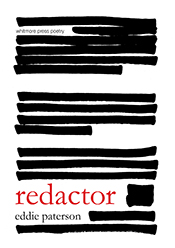The Blue Decodes
Grand Parade Poets, $23.95 pb, 102 pp, 9780994600202
The Blue Decodes by Cassie Lewis & redactor by Eddie Paterson
Two recent collections by two very different voices have both been ‘blurbed’ as works of fragmentation. In her début collection, Cassie Lewis is described as speaking for ‘a generation whose ambitions and emotions have become very fractured and fragmented’. Eddie Paterson’s new book is full of redacted texts of digital trash and treasure; it is a blacked-out, cut-up collage of the textual chatter of our ‘post-digital existence’. The lyric voice of The Blue Decodes, however, is less fracture and fragment, and more a compelling portrait of an alert mind in tension with itself. redactor is composed of censored, dismembered, remembered emails, memos, text messages, and webfeeds. While this might qualify as ‘uncreative writing’, in that its conceit is seemingly the inverse of the personal lyric, it, too, is a portrait of the artist reading, absorbing, repelling, mocking, and finding delight in a weird, flat, bewildering multiverse of screens where poems are being written all the time.
The idea of hopefulness is central to Lewis’s collection, which has been twenty years in the making. Images of the sacred and the profane, temple and town, host an oscillating meditation on the notion of hope. Sometimes hope is the unclaimed joys of youth, ‘a memory of happiness you couldn’t use’; sometimes hope is cast as an oddly watchful force exerting pressures on human follies and wounds. Lewis’s day job as a nurse is subtly evident in images of the rawness and brutality of the human work of being in the world. Other times, the collection’s voice finds itself in a stand-off with its central preoccupation: ‘What would hope do to me if I couldn’t stare it out?’ The poems’ speakers and characters betray longing for the transcendence that ritual or worship might provide, but this is a book of irreverent religious feeling, not of religion or religiosity. The exchange of forces that religion promises is often sought and found in the act of writing poetry: ‘Between the page and the eye is where the power happens.’
Continue reading for only $10 per month. Subscribe and gain full access to Australian Book Review. Already a subscriber? Sign in. If you need assistance, feel free to contact us.
















Leave a comment
If you are an ABR subscriber, you will need to sign in to post a comment.
If you have forgotten your sign in details, or if you receive an error message when trying to submit your comment, please email your comment (and the name of the article to which it relates) to ABR Comments. We will review your comment and, subject to approval, we will post it under your name.
Please note that all comments must be approved by ABR and comply with our Terms & Conditions.